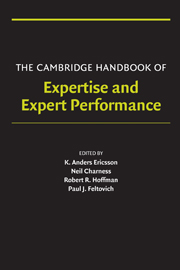Book contents
- Frontmatter
- Contents
- Acknowledgments
- Contributors
- PART I INTRODUCTION AND PERSPECTIVE
- PART II OVERVIEW OF APPROACHES TO THE STUDY OF EXPERTISE – BRIEF HISTORICAL ACCOUNTS OF THEORIES AND METHODS
- 4 Studies of Expertise from Psychological Perspectives
- 5 Educators and Expertise: A Brief History of Theories and Models
- 6 Expert Systems: A Perspective from Computer Science
- 7 Professionalization, Scientific Expertise, and Elitism: A Sociological Perspective
- PART III METHODS FOR STUDYING THE STRUCTURE OF EXPERTISE
- PART IV METHODS FOR STUDYING THE ACQUISITION AND MAINTENANCE OF EXPERTISE
- PART V DOMAINS OF EXPERTISE
- PART VI GENERALIZABLE MECHANISMS MEDIATING EXPERTISE AND GENERAL ISSUES
- Author Index
- Subject Index
- References
5 - Educators and Expertise: A Brief History of Theories and Models
from PART II - OVERVIEW OF APPROACHES TO THE STUDY OF EXPERTISE – BRIEF HISTORICAL ACCOUNTS OF THEORIES AND METHODS
- Frontmatter
- Contents
- Acknowledgments
- Contributors
- PART I INTRODUCTION AND PERSPECTIVE
- PART II OVERVIEW OF APPROACHES TO THE STUDY OF EXPERTISE – BRIEF HISTORICAL ACCOUNTS OF THEORIES AND METHODS
- 4 Studies of Expertise from Psychological Perspectives
- 5 Educators and Expertise: A Brief History of Theories and Models
- 6 Expert Systems: A Perspective from Computer Science
- 7 Professionalization, Scientific Expertise, and Elitism: A Sociological Perspective
- PART III METHODS FOR STUDYING THE STRUCTURE OF EXPERTISE
- PART IV METHODS FOR STUDYING THE ACQUISITION AND MAINTENANCE OF EXPERTISE
- PART V DOMAINS OF EXPERTISE
- PART VI GENERALIZABLE MECHANISMS MEDIATING EXPERTISE AND GENERAL ISSUES
- Author Index
- Subject Index
- References
Summary
Introduction
This chapter presents a brief historical account of educators' views about the nature of expertise and the roles experts have played in educational models to improve human performance. We provide a listing of historically relevant educators and a descriptive summary of the various learning theories and mechanisms advocated as fundamental components of high skill development. We also describe some of the methods used through history by which expertise and expert performance have been assessed from an educational standpoint.
In categorizing the historical record to undertake this task, it is apparent that the absence of definitions of, and the lack of differentiation between, terms such as experts, expertise, and expert performers, particularly in early and medieval contexts, presents a challenge to historical synthesis. In many historical writings, for example, terms such as “masters,” “teachers,” and “professors” are commonly used to denote highly skilled individuals, and any referent to “expertise” is often general in nature. The empirical descriptions provided by systematic investigation into the mechanisms underlying expertise and expert performance did not begin to appear in the historical account until the late nineteenth century, when operationalized definitions for performance phenomena were first developed and tested by the pioneering psychologists of that era.
The lack of empirical specificity in the earlier record does not preclude, however, the review and synthesis of either the role experts have played in past educational efforts or the historically prescribed techniques for the development of highly skilled performance.
- Type
- Chapter
- Information
- Publisher: Cambridge University PressPrint publication year: 2006
References
- 16
- Cited by

